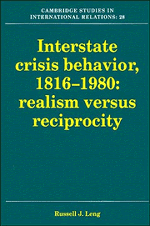Book contents
- Frontmatter
- Contents
- List of figures
- List of tables
- Preface
- 1 REALIST AND PSYCHOLOGICAL PERSPECTIVES
- 2 METHODOLOGY
- 3 THE CRISIS STRUCTURE AND WAR
- 4 PATTERNS OF BEHAVIOR
- 5 STRUCTURE, BEHAVIOR, AND OUTCOMES
- 6 INFLUENCE TACTICS
- 7 INFLUENCE STRATEGIES
- 8 RECIPROCATING INFLUENCE STRATEGIES
- 9 SUMMARY AND CONCLUSION
- EPILOGUE: THE 1990–1991 CRISIS IN THE PERSIAN GULF
- Appendices
- Notes
- References
- Index of names
- Index of subjects
- Titles in the series
3 - THE CRISIS STRUCTURE AND WAR
Published online by Cambridge University Press: 05 February 2010
- Frontmatter
- Contents
- List of figures
- List of tables
- Preface
- 1 REALIST AND PSYCHOLOGICAL PERSPECTIVES
- 2 METHODOLOGY
- 3 THE CRISIS STRUCTURE AND WAR
- 4 PATTERNS OF BEHAVIOR
- 5 STRUCTURE, BEHAVIOR, AND OUTCOMES
- 6 INFLUENCE TACTICS
- 7 INFLUENCE STRATEGIES
- 8 RECIPROCATING INFLUENCE STRATEGIES
- 9 SUMMARY AND CONCLUSION
- EPILOGUE: THE 1990–1991 CRISIS IN THE PERSIAN GULF
- Appendices
- Notes
- References
- Index of names
- Index of subjects
- Titles in the series
Summary
The essence of classical realism is summarized in Morgenthau's (1960:5) dictum that “statesmen think and act in terms of interest defined as power, and the evidence of history bears that out.” If Morgenthau is correct, then we should find that the outcomes of crises are strongly associated with the intersection of the perceived interests and comparative capabilities of the two sides.
Within the context of a militarized crisis, power can be defined as the capacity to influence the behavior of other states. From a realist perspective, the most critical measure of power is the state's comparative war-fighting capability. Realists would argue that the amount of risk that a state should be willing to take to demonstrate its resolve to achieve, or to maintain, its interests is dependent on the balance between those interests and the consequences of war. The weight of the first is a function of the extent to which security interests are at stake; the weight of the second is based on the state's utility for war, which is dependent on the war-fighting capabilities of its side vis-à-vis those of the adversary.
Perceived interests and comparative capabilities may be viewed as the two most critical components of the crisis structure. Which of the two – capabilities or interests – exerts a stronger influence on foreign policy behavior has been the subject of debate. For some realists (Blainey, 1973; Lebow, 1981), perceptions of comparative war-fighting capabilities are the critical variable. They argue that states perceiving themselves as militarily superior will be more risk acceptant, because the prospect of war exerts less of a restraining influence.
- Type
- Chapter
- Information
- Interstate Crisis Behavior, 1816–1980 , pp. 45 - 65Publisher: Cambridge University PressPrint publication year: 1993



